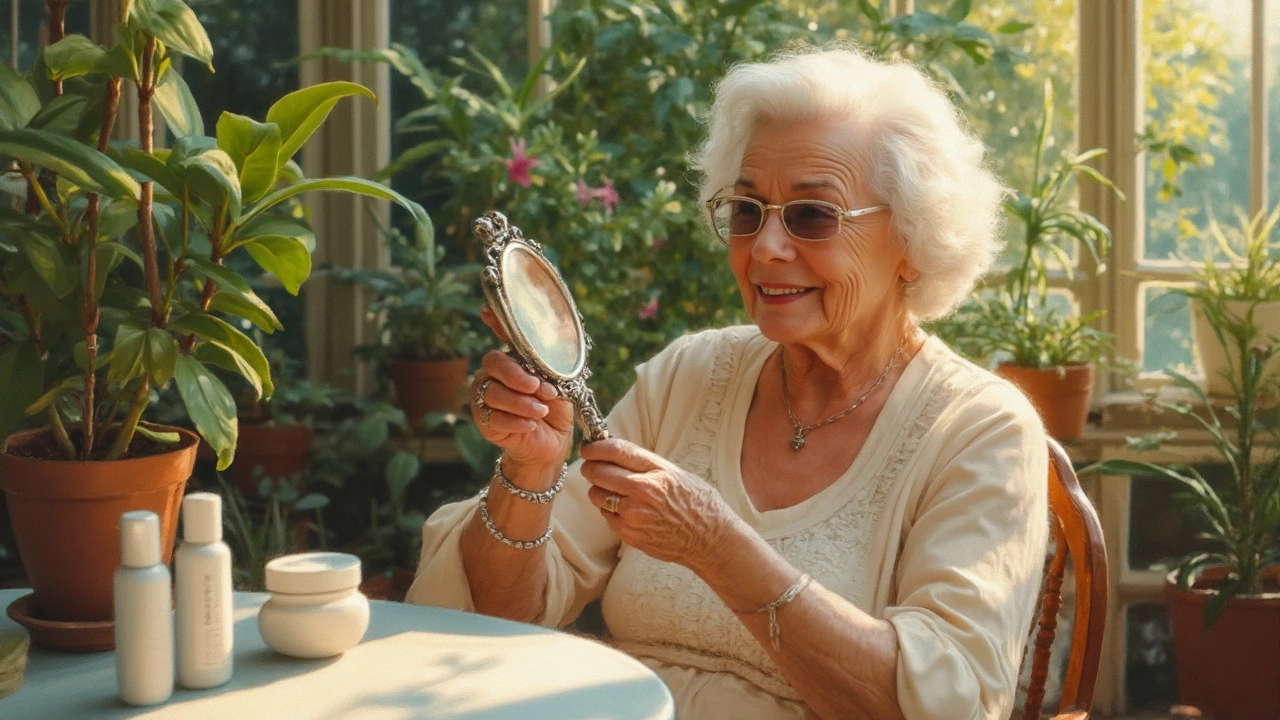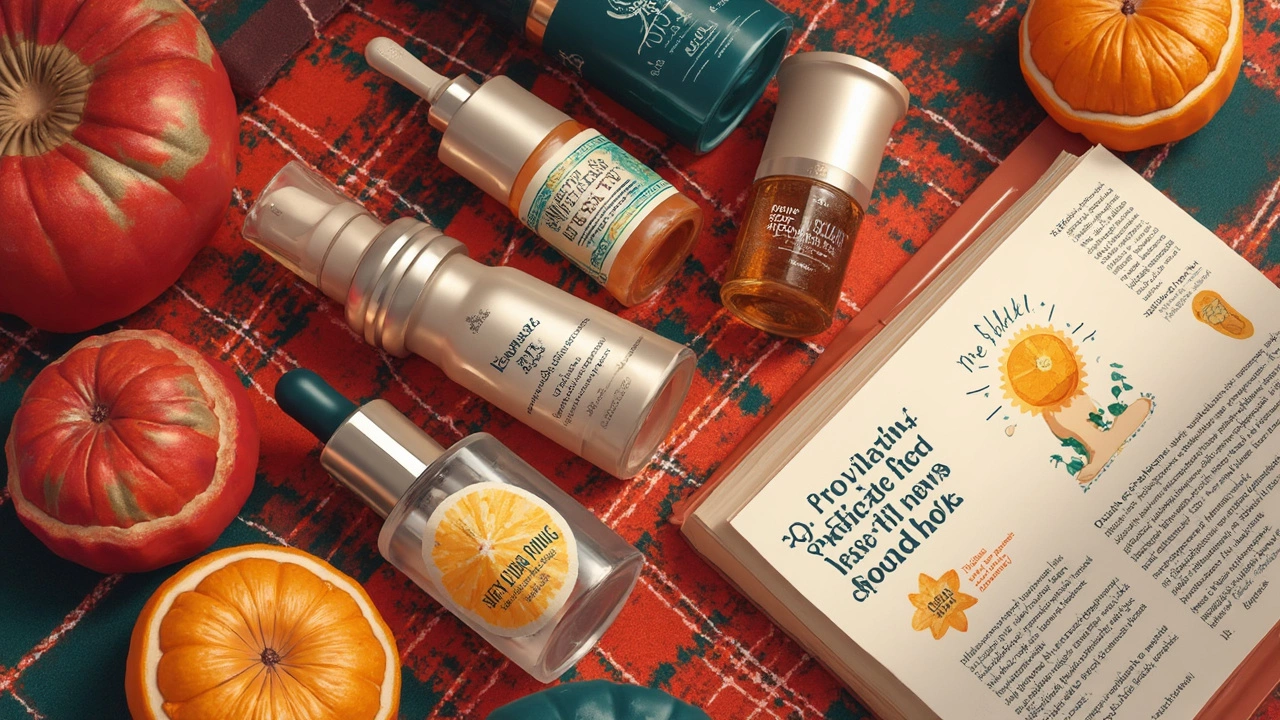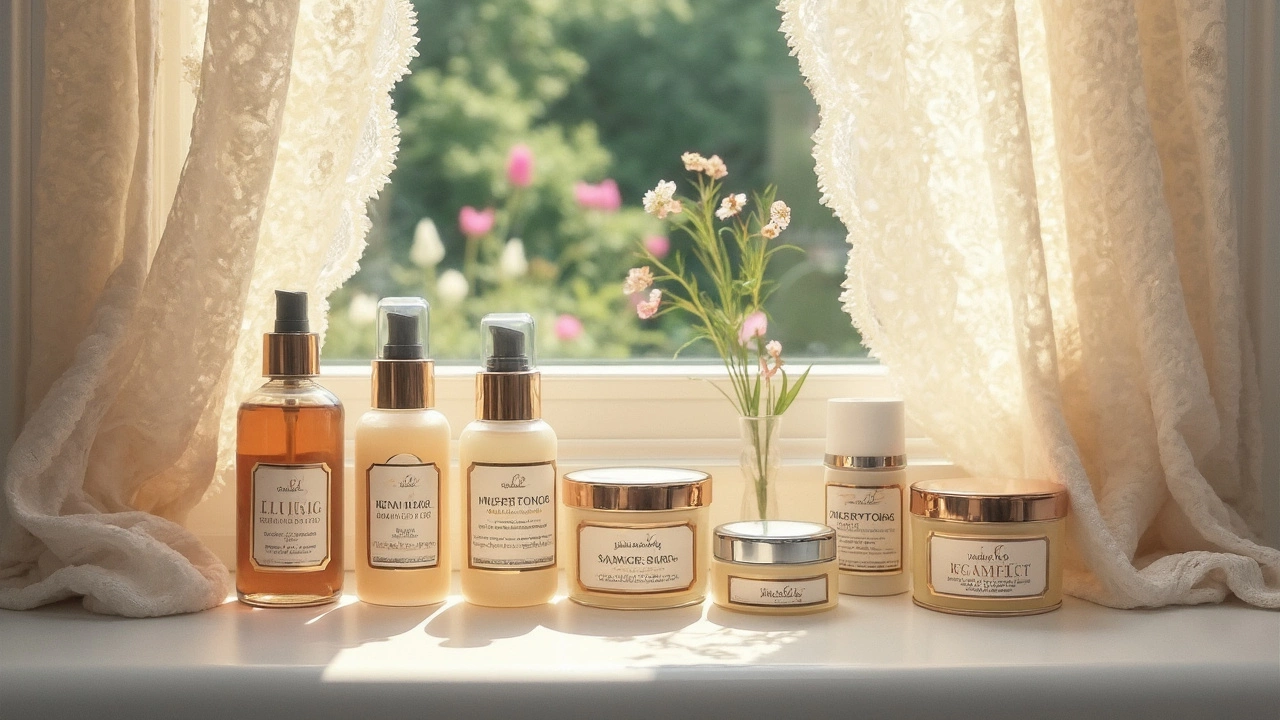Ever notice a new wrinkle or an age spot and wonder if there's something you can do about it? Well, welcome to the club! As we get older, our skin changes. But don't worry—you don't need to break the bank to find effective solutions.
Let's start with the basics. First, it's important to keep your skin hydrated. A gentle cleanser and a rich moisturizer can work wonders for keeping your skin plump. Why plump? It helps make those fine lines less noticeable.
Next up, sun protection. Yep, you've heard it before, but sunscreen really is your best friend here. Not only does it prevent sun damage, but it also slows down those tell-tale signs of aging.
Curious about anti-aging ingredients? Retinoids and vitamin C are the go-to's. Retinoids help with cell turnover, which can reduce wrinkles and improve texture. Vitamin C is great for brightening the skin and tackling those pesky age spots.
Finally, don't forget about exfoliation. Nothing fancy, just a mild one a couple of times a week can do wonders in keeping your skin fresh and smooth.
Understanding Aging Skin
Let's face it, aging is a part of life, and our skin often shows the first signs. But what's really happening beneath the surface?
What's Going On Underneath?
As we age, our skin naturally loses collagen and elastin, which are proteins that keep it looking firm and bouncy. This is why you might start to see fine lines or notice that your skin isn't as tight as it once was.
"By age 30, you lose about 1% of collagen each year," says Dr. Ava Shamban, a renowned dermatologist. "This gradual decline contributes significantly to visible signs of aging."
The Role of Hydration and Thinning
The skin also gets drier and thinner with time, which can make it more prone to wrinkles and those tricky age spots. Hydration is key here, not just by drinking water but using the right products too.
Checking in with how your skin's feeling—maybe a little dryer or more sensitive—can guide you to products that give it exactly what it needs.
External Influences
While aging's a natural process, factors like sun exposure, pollution, and even stress can speed things up. Sun in particular can cause what dermatologists call 'photoaging,' leading to those pesky spots and uneven skin tones.
| Factor | Impact on Skin |
|---|---|
| Sun Exposure | Speeds up aging, causes wrinkles and spots |
| Pollution | Can cause dullness and damage over time |
| Stress | Makes skin more sensitive and reactive |
Understanding these influences can help you make small tweaks to your daily habits that really add up in the long run.
It's Never Too Late to Start
Good news—it's never too late to start taking care of your skin. With the right knowledge and a few well-chosen products, you can tackle the signs of skin aging head-on, making improvements over time. Stay tuned for more detailed tips in the next sections!
Skincare Essentials
Alright, let's get into the nitty-gritty of your skincare routine. If you're dealing with aging skin, there are a few essentials you shouldn't skip. Think of these as the backbone of keeping your skin healthy and glowing as the years go by.
Cleansing
The first step in any solid routine is cleansing. Go for a gentle, sulfate-free cleanser that won't strip your skin of its natural oils. Your skin’s barrier should stay intact to fend off dryness and irritation. Morning and night—that's your cleansing mantra.
Moisturizing
Moisturizers are the MVPs in your battle against dryness. Look for ingredients like hyaluronic acid or peptides. They're like a drink of water for your skin, helping to restore that youthful plumpness. Use it twice daily for the best results.
Sunscreen
This one's non-negotiable. A broad-spectrum sunscreen with at least SPF 30 is your best defense against further damage and premature aging. Make applying sunscreen a daily ritual, even when it's cloudy.
Exfoliation
But only a little bit! Overdoing it can cause more harm than good. Stick to a mild exfoliator once or twice a week. Look for products with lactic acid or glycolic acid—they’re effective but gentle.
Targeted Treatments
Retinoids and vitamin C serums are brilliant additions to your arsenal. Retinoids stimulate collagen production, reducing fine lines, while vitamin C fights free radicals and brightens the complexion. Introduce them into your routine gradually to avoid irritation.
Pro Tip:
Always introduce new products one at a time. That way, if your skin freaks out, you know the culprit.
Sticking to these essentials can make a world of difference. It’s not about having a shelf full of products but using ones that make a real difference. Every step counts towards a healthier and happier complexion!

Key Ingredients
When it comes to caring for aging skin, knowing the right ingredients can make all the difference. Let's break down some of the heavy hitters you should be looking out for.
Retinoids
Retinoids are a derivative of vitamin A, often hailed as a game-changer for anti-aging. They boost collagen production and speed up cell turnover, helping to reduce wrinkles and improve skin texture. Start with a low concentration to let your skin adjust.
Vitamin C
This powerhouse antioxidant is great for brightening the skin and reducing age spots. It's like a super hero for your skin by fighting off free radicals. Look for serums with a stable form of vitamin C like L-ascorbic acid for best results.
Hyaluronic Acid
If hydration is what you need, then hyaluronic acid should be your go-to. This ingredient can hold up to 1000 times its weight in water, which means plumper, more hydrated skin. It's usually found in serums and creams.
Niacinamide
Also known as vitamin B3, niacinamide is fantastic at tackling uneven skin tone and reducing pore size. It helps your skin improve its barrier function, making it less prone to redness and irritation.
Peptides
Last but not least, peptides are great for sending signals to your skin to ramp up collagen production. They're essential proteins that play a big role in making your skin appear more youthful and firm.
Remember, using a combination of these ingredients tailored to your skin's needs can lead to the best results. We all have different skin types, so what works for one person might not work for another. A little trial and error might be needed, but your skin will thank you in the long run!
Lifestyle Tips
Ever thought your daily habits might be tickling those aging skin woes? What you do every day can have a big impact on how your skin ages. But the good news is, small changes can make a huge difference.
Stay Hydrated
Let's face it, we're all guilty of not drinking enough water sometimes. But staying hydrated is crucial. It helps to keep your skin moisturized from the inside out.
Eat a Balanced Diet
Remember, "you are what you eat" isn't just a saying. A diet rich in omega-3 fatty acids, antioxidants, and vitamin-rich foods will feed your skin with the nutrients it needs. Think of fruits like berries, leafy greens, and nuts.
Manage Stress
Stress isn't just bad for your health—it's a sneaky culprit in aging too. Stress management techniques like meditation or yoga can work wonders for both your mental health and your skin.
"Managing stress effectively can contribute to physical health benefits, including better skin health," says Christine Carter, a happiness expert from UC Berkeley.
Get Enough Sleep
Ah, the elusive 'beauty sleep'. It turns out, it's not just a myth. Your skin repairs itself while you snooze, making sleep a natural beauty treatment.
- Try to get at least 7-8 hours of sleep each night to let your skin work its magic.
- Keep your bedroom cool and dark to promote better sleep.
Regular Exercise
Exercise increases blood circulation, which helps to deliver nutrients and oxygen to your skin that are important for skin health. Plus, it can help reduce stress!
Remember, these are easy tweaks you can fit into your daily life. No need to overhaul your whole routine—just start with one or two changes and see how they work for you. Your future self might just thank you!

Daily Routine
Creating the perfect daily routine for aging skin doesn’t have to be an overwhelming task. The key is consistency and using products suited to your unique skin needs. Let's break down a simple yet effective routine to keep your skin looking its best.
Morning Routine
Starting your day with the right steps sets the tone for skincare success. Here’s what you need to do:
- Cleanse: Use a gentle cleanser to wash away any overnight oil and dirt.
- Serum: Apply a vitamin C serum. This powerhouse antioxidant helps brighten skin and fade dark spots.
- Moisturize: Lock in hydration with a lightweight moisturizer to keep skin plump and hydrated throughout the day.
- Sunscreen: Never skip this step! A good sunscreen with at least SPF 30 is crucial to protect against harmful UV rays that contribute to skin aging.
Evening Routine
Your evening routine is all about repairing and preparing the skin for overnight rejuvenation. Here's how:
- Double Cleanse: Start with an oil cleanser to remove makeup, followed by a gentle water-based cleanser to wash away impurities.
- Exfoliate: Two to three times a week, use a mild exfoliant to buff away dead skin cells and improve texture.
- Treatment: This is the time for treatment serums, like retinoids, which help with cell turnover and reducing wrinkles. Start with a small amount to see how your skin tolerates it.
- Moisturize: Apply a richer moisturizer or night cream to nourish the skin while you sleep.
Additional Tips:
- Don’t forget the neck and hands; they show signs of aging just as much as your face.
- Consider using a silk pillowcase to reduce irritation and friction on your skin overnight.
- Stay hydrated! Water supports skin’s appearance and health.
By making these steps a regular part of your day, you're giving your aging skin the care and attention it deserves. Aim to adapt these tips into a habit, and the results will follow.

